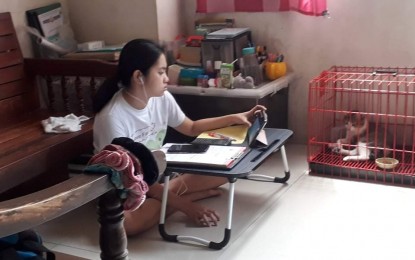
DISTANCE LEARNING. Senior high school student, Ana Crescini Nepomuceno, attends an online class from her home in Malabon City on Friday (Oct. 2, 2020). As the country shifts to blended learning to ensure continued education amid Covid-19, many students long to see their friends and teachers in face-to-face classes, believing that learning is more fun and effective in the traditional way. (Photo by Priam Nepomuceno)
MANILA – Thanks to modern technology and the Internet, learning continues for students amid the coronavirus disease 2019 (Covid-19) crisis.
However, virtual learning cannot simply replace someone's happiness in interacting with friends and teachers in the flesh.
As the saying goes, absence makes the heart grow fonder.
With many students feeling lonely due to isolation brought by quarantine restrictions, they look forward to the day they reunite with their peers.
Gerard Nate Gutierrez, a Grade 11 student taking up the Science, Technology, Engineering, and Mathematics (STEM) track in a private school in Malabon City, said he still prefers face-to-face classes to online classes.
"(This way,) you get to study with your friends, which is a lot more fun," Gerard, a resident of Concepcion, Malabon, said in an interview with the Philippine News Agency (PNA) on Friday.
Online classes in their school began on August 28.
During online classes, he said, students like him are seemingly more focused on their gadgets to meet deadlines for academic requirements.
Gerard said he misses physical activities and interactions associated with face-to-face classes.
Despite missing his friends under this new learning setup, he counts himself lucky as he is able to proceed with his studies, noting that not all students enjoy the same privilege.
Another STEM student, Merlaine Angelene Bernal, a resident of Tonsuya, Malabon, said lessons under the traditional face-to-face setup are much easier to understand, thanks to the effort of their teachers.
Merlaine echoed Gerard's statement that students enrolled in online classes are more focused on submitting their requirements rather than understanding their lessons.
Despite this, she said, they manage to study in the comfort of their homes.
Meanwhile, Ana Crescini Nepomuceno, another STEM student, said she finds online classes draining for students and teachers alike and still prefers the traditional face-to-face classes.
Ana also finds it exhausting to wake up as early as 5:30 a.m. as logging in for their classes start exactly at 6:15 a.m.
She said the need to constantly focus on her tablet computer on a day-to-day basis is causing her eyestrain and forcing her to study even on weekends.
Despite this, Ana said online classes are still a boon as she is able to study in the safety of her home in Niugan, Malabon and that projects and requirements often have longer deadlines, compared to face-to-face classes.
While many private schools have begun classes in recent months, the Department of Education said blended learning classes in public schools would start on October 5. (PNA)
